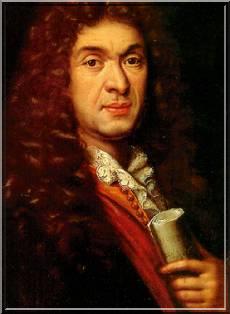
Lully was born in Florence, Italy. Lully had little education, musical or otherwise, but he had a very natural talent to play the guitar and violin and to dance. In 1646, he was discovered by Roger de Lorraine, the chevalier de Guise, son of Charles, Duke of Guise, and taken to France by him, where he entered the services of Mademoiselle de Montpensier (la Grande Mademoiselle) as a scullery-boy and Italian-language teacher. With the help of this princess, his musical talents were cultivated. He studied the theory of music under Nicolas Métru. It has been said that a scurrilous song on his patroness (the doggerel he set to music refers to a "sigh" she produced while at stool) resulted in his dismissal. It is far more likely that he did not want to moulder out in the provinces with the exiled princess. He came into Louis XIV's service in late 1652, early 1653 as a dancer. He composed some music for the Ballet de la Nuit, which pleased the king immensely. He was appointed as the composer of instrumental music to the king and conducted the royal string orchestra of the French court, Les Vingt-quatre Violons du Roi (Twenty-four Violins of the King) or the Grande Bande (large band). He tired of the lack of discipline of the Grande Bande and, with the King's permission, formed his own Petits Violons. Lully composed many ballets for the King during the 1650s and 1660s, in which the King and Lully himself danced. He also had tremendous success composing the music for the comedies of Molière, including Le Mariage forcé (1664), L'Amour médecin (1665), and Le Bourgeois gentilhomme (1670). It was when he met Molière that together they created the Comédie-Ballet. Louis XIV's interest in ballet waned as he aged, and his dancing ability declined (his last performance was in 1670) and so Lully pursued opera. He bought the privilege for opera from Pierre Perrin and, with the backing of Jean-Baptiste Colbert and the king, created a new privilege which essentially gave Lully complete control of all music performed in France until his death. He was known to be a libertine. In 1661, in letters of naturalization and in his marriage contract to Madeleine Lambert, daughter of Lully's friend and fellow musician Michel Lambert, Giovanni Battista Lulli declared himself as "'Jean-Baptiste de Lully, escuyer' son of 'Laurent de Lully, gentilhomme Florentin'". Although his life is full of meteoric heights, his love affairs with men and women also brought him down in scandal several times at the great displeasure of Louis XIV. Despite these scandals, he always managed to get back into the good graces of Louis XIV who found Lully essential for his musical entertainments and who thought of Lully as one of his few true friends. On January 8, 1687, Lully was conducting a Te Deum in honor of Louis XIV's recent recovery from illness. He was beating time by banging a long staff (a precursor to the bâton) against the floor, as was the common practice at the time, when he struck his toe, creating an abscess. The wound turned gangrenous, but Lully refused to have his toe amputated and the gangrene spread, resulting in his death on 22 March. He left his last opera, Achille et Polyxène, unfinished. His two sons Jean-Louis Lully and Louis Lully also had musical careers at the French court.
Source : © Wikipedia
Free sheet music
|